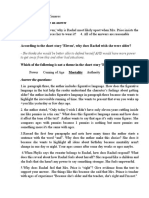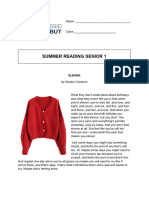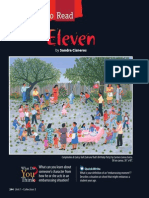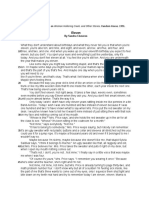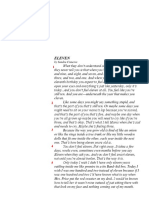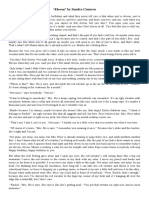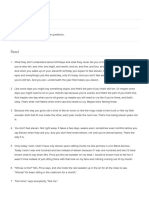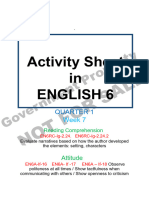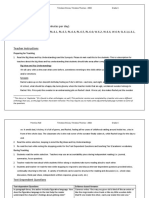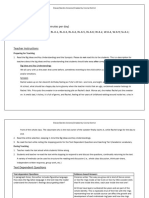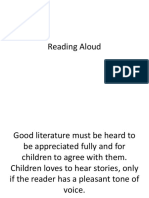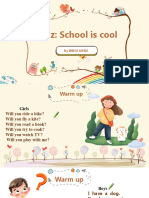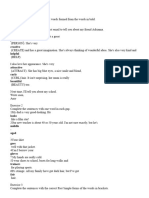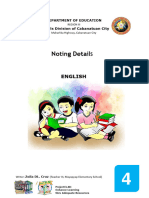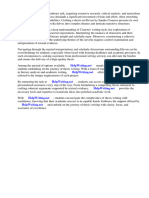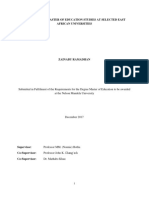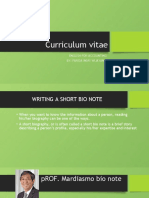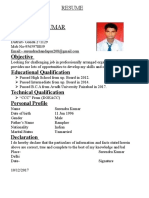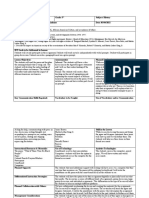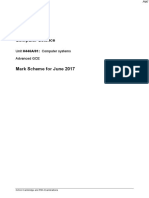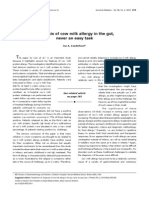Eleven
Eleven
Uploaded by
Giorgi AptsiauriCopyright:
Available Formats
Eleven
Eleven
Uploaded by
Giorgi AptsiauriOriginal Title
Copyright
Available Formats
Share this document
Did you find this document useful?
Is this content inappropriate?
Copyright:
Available Formats
Eleven
Eleven
Uploaded by
Giorgi AptsiauriCopyright:
Available Formats
1. What is special about the day in this story?
special about the day in this story is that when you're
eleven, you're also ten, and nine, and eight, and seven, and six, and five, and four, and three, and two
and one. And when you wake up on your eleventh birthday you expect to feel eleven, but you don't. You
open your eyes and everything's just like yesterday, only it's today.the way you grow old is kind of like an
onion or like the rings inside .tree trunk or like my little wooden dolls that fit one inside the other, each
year inside the next one.
2. What article of clothing causes difficulties? there was red sweater which was sitting in the coat room
for a month, it was ugly with red plastic buttons and a colars and sleeves were all stretched. teacher was
trying to proove that this sweater belonged to her but, it was not hers.
3. What must Rachel do at the end of math period? she wanted to take red sweater and throw it over
the schoolyard fence or leave it hanging on a parking meter.
4. How is the mix-up straightened out?
5. How does Rachel feel at the end of the story? it was her birthday but she feels sick inside, she wants
to be far away, far away like a runaway ballon, like small o in the sky.
Critical Thinking
1. Explain how Rachel can be eleven, but also all her younger ages as well. maybe she is eleven but
some days she might say something stupid, and that's the part of her that's still ten. she might need to
sit on her mama's lap because she is scared, and that's the part of her that's five. And maybe one day
she will need to cry like if she is three.
2. Why can’t Rachel speak up to tell Mrs. Price the sweater is not hers? Because she's older and she's the
teacher, she's right and I'm not, so nothing comes out of her mouth
3. Why does Rachel react so strongly to being given the sweater? she reacts so strongly because this
sweater is not hers, and teacher is trying to proove that sweater belongs to racher. also this sweater
looks ugly and thats one of the reason she dont wants take it.
4. Why does Rachel say the cake will be ‘too late”?
5. In what ways do past years stay with a person through time? Like some days you might say something
stupid, and that's the part of you that's still ten. Or you might need to sit on your mama's lap because
you're scared, and that's the part of you that's five. And maybe one day you will need to cry like if you're
three
6. In what ways do you identify with Rachel in “Eleven”?
7. Give both – direct and indirect characterizations of Rachel:
Include details & examples; cite some from the text.
Close reading questions for “Eleven” by Sandra Cisneros
1. Why might the story both begin and end with the narrator’s counting
backwards from eleven to one: “you’re eleven, you’re also ten, and nine, and
eight . . .”(2-3)?
2. What is significant about the number eleven? Why might this represent such
an important birthday?
3. Why does the narrator continue to repeat the words “stupid” and “dumb”?
How does this repetition create tension in the story?
4. How does story shift between interior monologue and dialogue? What is the
effect?
5. Why can Rachel not tell Mrs. Price that the sweater doesn’t belong to her?
Does the narrator’s use of language help us anticipate her timidity?
6. What parts of the story are examples of Rachel’s maturity and wisdom
beyond her years?
7. What does Rachel mean when she says, “[I]t’s too late” (120)? What tone or
attitude is reflected here?
8. How might parts of the passage be particularly reflective of a female
narrative?
You might also like
- Eleven by CisnerosDocument3 pagesEleven by CisnerosEdna ReyesNo ratings yet
- Eleven Sandra Cisneros PDFDocument12 pagesEleven Sandra Cisneros PDFapi-27870660288% (8)
- Eleven: Questions For ThoughtDocument3 pagesEleven: Questions For ThoughtAmethyst100% (1)
- Quantitative Measurement, Reliablity, ValidityDocument36 pagesQuantitative Measurement, Reliablity, ValidityDiana Rizky YulizaNo ratings yet
- Oykulerle Ingilizce Ogreniyorum: Ingilizce Ogreniyorum, #2From EverandOykulerle Ingilizce Ogreniyorum: Ingilizce Ogreniyorum, #2No ratings yet
- Eleven: by Sandra CisnerosDocument5 pagesEleven: by Sandra CisnerosGiorgi Qardava100% (1)
- Jems201710 DL PDFDocument137 pagesJems201710 DL PDFMduduziNo ratings yet
- Christian Philosophy of EducationDocument3 pagesChristian Philosophy of Educationapi-543930057100% (2)
- ENG 6 Q 1 WK 7 Day 1-5Document91 pagesENG 6 Q 1 WK 7 Day 1-5John LouieNo ratings yet
- English 6, Quarter 1, Week 7, Day 1Document32 pagesEnglish 6, Quarter 1, Week 7, Day 1Rodel AgcaoiliNo ratings yet
- Evaluate Narratives Based On Character and SettingDocument26 pagesEvaluate Narratives Based On Character and SettingEiram Williams100% (7)
- A Day of Change - MarkupsDocument5 pagesA Day of Change - Markupsapi-241229061No ratings yet
- English 6 Quarter 1 Week 6-Day 1Document35 pagesEnglish 6 Quarter 1 Week 6-Day 1Elizabeth Molina MamaclayNo ratings yet
- ElevenDocument3 pagesElevenLaurentia BotnaruNo ratings yet
- English Gr. 6 QTR 3 Week 6 LAS PDFDocument7 pagesEnglish Gr. 6 QTR 3 Week 6 LAS PDFJoshua Jie MaquisoNo ratings yet
- Summer Reading Senior 1Document9 pagesSummer Reading Senior 1jazkrasNo ratings yet
- DLL - EN6 1st Quarter Week 7 Day 1Document7 pagesDLL - EN6 1st Quarter Week 7 Day 1Jeclyn D. FilipinasNo ratings yet
- ElevenDocument10 pagesElevenapi-291667973No ratings yet
- Ingles VictorDocument3 pagesIngles Victorbrawlid12341234No ratings yet
- ElevenDocument10 pagesElevenapi-252903312No ratings yet
- 4.sample Literary Essay - Eleven - by Sandra CisnerosbdocxDocument1 page4.sample Literary Essay - Eleven - by Sandra CisnerosbdocxKiziahlyn Fiona BibayNo ratings yet
- End-Of-Course Test Grammar, Vocabulary, and Pronunciation ADocument9 pagesEnd-Of-Course Test Grammar, Vocabulary, and Pronunciation AОксанаNo ratings yet
- 4Untitled documentDocument2 pages4Untitled documentjaelyz.a.rodriguezNo ratings yet
- Eleven - CisnerosDocument3 pagesEleven - CisnerosluciasnmNo ratings yet
- EFAL Grade 10 Booklet 2 Term 2 MAY 2023 2Document33 pagesEFAL Grade 10 Booklet 2 Term 2 MAY 2023 2ncuncum2No ratings yet
- Beginners' Book in Language. A Book for the Third GradeFrom EverandBeginners' Book in Language. A Book for the Third GradeNo ratings yet
- INTERVIEWDocument7 pagesINTERVIEWNina Anne BergadoNo ratings yet
- ElevenDocument3 pagesElevenLucas De PalmaNo ratings yet
- Interactive Strategies For Teaching Students Response To LiteratureDocument23 pagesInteractive Strategies For Teaching Students Response To LiteratureSerge TingaNo ratings yet
- Eleven - Written WorkDocument12 pagesEleven - Written WorkFatima R, Hiba, HuzaifaNo ratings yet
- Literacy BibliographyDocument10 pagesLiteracy Bibliographyapi-271388035No ratings yet
- GENESIS MIRANDA - THOMS Section #7 Review - 2022 PDFDocument4 pagesGENESIS MIRANDA - THOMS Section #7 Review - 2022 PDFGENESIS MIRANDANo ratings yet
- Hooked on Riddles: A Guide to Teaching Math Science English and Other Subjects Using Fun Word Plays and Silly JokesFrom EverandHooked on Riddles: A Guide to Teaching Math Science English and Other Subjects Using Fun Word Plays and Silly JokesNo ratings yet
- EFAL Grade 10 Booklet 2 Term 2 MAY 2024 2Document33 pagesEFAL Grade 10 Booklet 2 Term 2 MAY 2024 2esterhuizendiane123No ratings yet
- "Eleven" by Sandra CisnerosDocument6 pages"Eleven" by Sandra CisnerosNepthali Agudos CantomayorNo ratings yet
- "Eleven" textDocument3 pages"Eleven" textsejong4evaNo ratings yet
- Eleven ResponseDocument2 pagesEleven Responseapi-395353190No ratings yet
- Year 5 Remote Learning Week Beginning 18.01.21Document15 pagesYear 5 Remote Learning Week Beginning 18.01.21Areebah IslamNo ratings yet
- Ingles JairoDocument9 pagesIngles Jairolakblak 3No ratings yet
- 1 Buku Siswa Naratif Final1Document28 pages1 Buku Siswa Naratif Final1Lini MaliqisnayantiNo ratings yet
- Activity Sheet in English 6: Quarter 1Document7 pagesActivity Sheet in English 6: Quarter 1NOEMI VALLARTANo ratings yet
- Stories Eleven Essay PromptDocument3 pagesStories Eleven Essay Promptapi-302331022No ratings yet
- My Third Latino Monologue Book: Finding Your VoiceFrom EverandMy Third Latino Monologue Book: Finding Your VoiceRating: 5 out of 5 stars5/5 (1)
- Grade 6 AAP Lesson-Eleven PERFECTDocument15 pagesGrade 6 AAP Lesson-Eleven PERFECTmeltemNo ratings yet
- Units 5-6 Test BDocument4 pagesUnits 5-6 Test BAllisson CornejoNo ratings yet
- Professional Learning Portfolio Theory To Practice Questions EDUC 5413 Abigail HallettDocument14 pagesProfessional Learning Portfolio Theory To Practice Questions EDUC 5413 Abigail Hallettapi-310498223No ratings yet
- 6.eleven - Lesson - StoryDocument12 pages6.eleven - Lesson - StoryJulia NigmatullinaNo ratings yet
- Reading Aloud (Sumalinog Child Lit.Document35 pagesReading Aloud (Sumalinog Child Lit.glennNo ratings yet
- Eleven, CisnerosDocument3 pagesEleven, CisnerosMafaldaNo ratings yet
- Speakout Vocabulary Extra Advanced Unit 09Document3 pagesSpeakout Vocabulary Extra Advanced Unit 09shasha1982No ratings yet
- Quiz School Is Cool 4 ADocument20 pagesQuiz School Is Cool 4 AIrina UrsuNo ratings yet
- Mrs. Franchy's Evil Ring And The Six Months That Changed EverythingFrom EverandMrs. Franchy's Evil Ring And The Six Months That Changed EverythingNo ratings yet
- Final Speer Electronic Book FileDocument44 pagesFinal Speer Electronic Book Fileapi-317331795No ratings yet
- 21ST LitDocument11 pages21ST LitKriezhel Kim TadleNo ratings yet
- Self-Check 5 KeyDocument3 pagesSelf-Check 5 KeySisiNo ratings yet
- Riddles (Research)Document27 pagesRiddles (Research)Lotus EscatronNo ratings yet
- A Literary EssayDocument3 pagesA Literary EssayKevin MakNo ratings yet
- Smart Planet 4 Vocabulary Extension WorksheetDocument9 pagesSmart Planet 4 Vocabulary Extension WorksheetOscar Cruz100% (1)
- ENGLISH G4 Q1 W3 L1-Converted-Noting-DetailsDocument15 pagesENGLISH G4 Q1 W3 L1-Converted-Noting-Detailsdjoone.deeNo ratings yet
- Eleven Sandra Cisneros ThesisDocument6 pagesEleven Sandra Cisneros Thesisgxirgjwff100% (2)
- 2023 AP Psychology 6 Week Study PlanDocument1 page2023 AP Psychology 6 Week Study PlanPrishita BhattNo ratings yet
- Zainabu RamadhanDocument217 pagesZainabu RamadhanKristine Dahang MabalosNo ratings yet
- Curriculum Vitae: English For Accounting By: Farida Indri WijayantiDocument12 pagesCurriculum Vitae: English For Accounting By: Farida Indri WijayantiNatasya NoviNo ratings yet
- Check Point Mobile GuideDocument24 pagesCheck Point Mobile Guidebn2552No ratings yet
- Cheat Sheet - Self DiscoveryDocument5 pagesCheat Sheet - Self DiscoveryMegha JawaleNo ratings yet
- Graphic Narrative Analysis EssayDocument3 pagesGraphic Narrative Analysis Essayapi-214385850No ratings yet
- Histo and Philo of Ste SyllabusDocument3 pagesHisto and Philo of Ste SyllabusFrancisco Oringo Sr ESNo ratings yet
- POSCO-Asia Fellowship Application Form 2006-8 (060224)Document4 pagesPOSCO-Asia Fellowship Application Form 2006-8 (060224)Muhammad Zaheer AnwarNo ratings yet
- 2019 Online PortfolioDocument3 pages2019 Online Portfolioapi-404422961No ratings yet
- Nid Electrical and Electronics TechnologyDocument208 pagesNid Electrical and Electronics Technologyglobaltech1111No ratings yet
- Armed Forces Officers SelectionDocument4 pagesArmed Forces Officers SelectionsaifulpashaNo ratings yet
- Surendra Kumar: Objective Educational QualificationDocument1 pageSurendra Kumar: Objective Educational Qualificationsurendra kumarNo ratings yet
- Chapter 9 Summary NotesDocument6 pagesChapter 9 Summary Notesshiela badiangNo ratings yet
- A Capstone Course On Agile Software Development Using ScrumDocument9 pagesA Capstone Course On Agile Software Development Using ScrumLenin OrmazaNo ratings yet
- English Speech TextDocument2 pagesEnglish Speech Text01. Alden RafazhaNo ratings yet
- MOOC Cellular Regeneration ArticleDocument5 pagesMOOC Cellular Regeneration ArticleahmatogreNo ratings yet
- Kami Export - Student Example Big Ideas Sheet and Assignment SheetDocument5 pagesKami Export - Student Example Big Ideas Sheet and Assignment Sheetapi-506133017No ratings yet
- Competency Based Learning and Development Plan PDFDocument33 pagesCompetency Based Learning and Development Plan PDFMis M Estoperes0% (1)
- SS5H6 Describe The Importance of Key People, Events, and Developments Between 1950-1975Document6 pagesSS5H6 Describe The Importance of Key People, Events, and Developments Between 1950-1975api-547906787No ratings yet
- Lista Completa de Partes Renault Codigos OriginalesDocument904 pagesLista Completa de Partes Renault Codigos Originalespolaco822003No ratings yet
- Submitted To: Under The Guidance ofDocument5 pagesSubmitted To: Under The Guidance ofNithya RajNo ratings yet
- Real Time Operating SystemsDocument35 pagesReal Time Operating SystemsNeerajBoora100% (1)
- June 2017 MS - Paper 1 OCR Computer Science A-LevelDocument27 pagesJune 2017 MS - Paper 1 OCR Computer Science A-LevelShamsul ArifinNo ratings yet
- Episodes in The Life of Francesca WilsonDocument369 pagesEpisodes in The Life of Francesca WilsonArsa Arrikitaun100% (1)
- Alergi Susu SapiDocument2 pagesAlergi Susu SapiMaya FikriNo ratings yet
- G1 MAPEH Q1 1stobservationDocument5 pagesG1 MAPEH Q1 1stobservationChrissa Faith ManegoNo ratings yet
- Newtons Ist Law of MotionDocument3 pagesNewtons Ist Law of MotionNaome100% (1)













